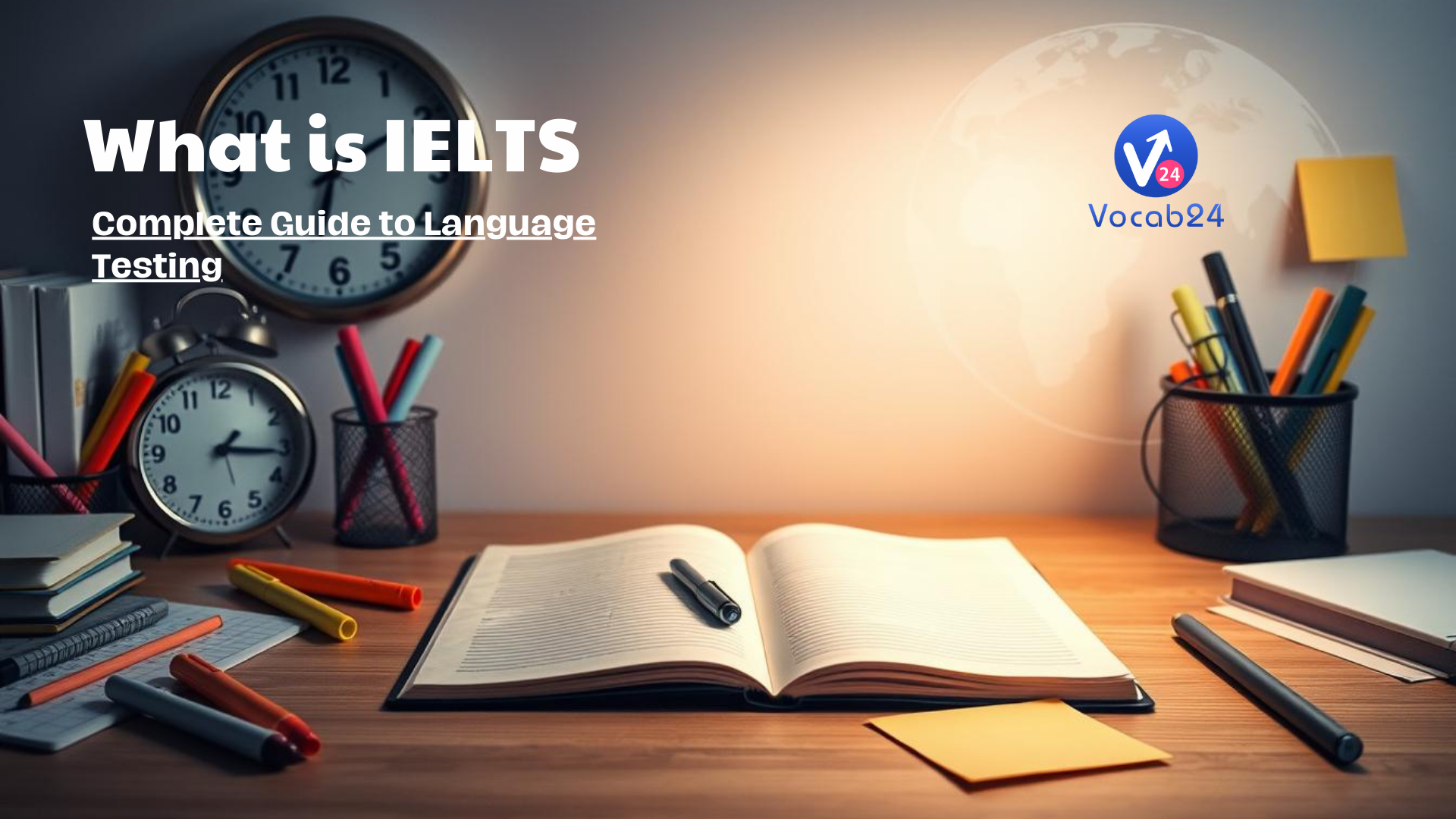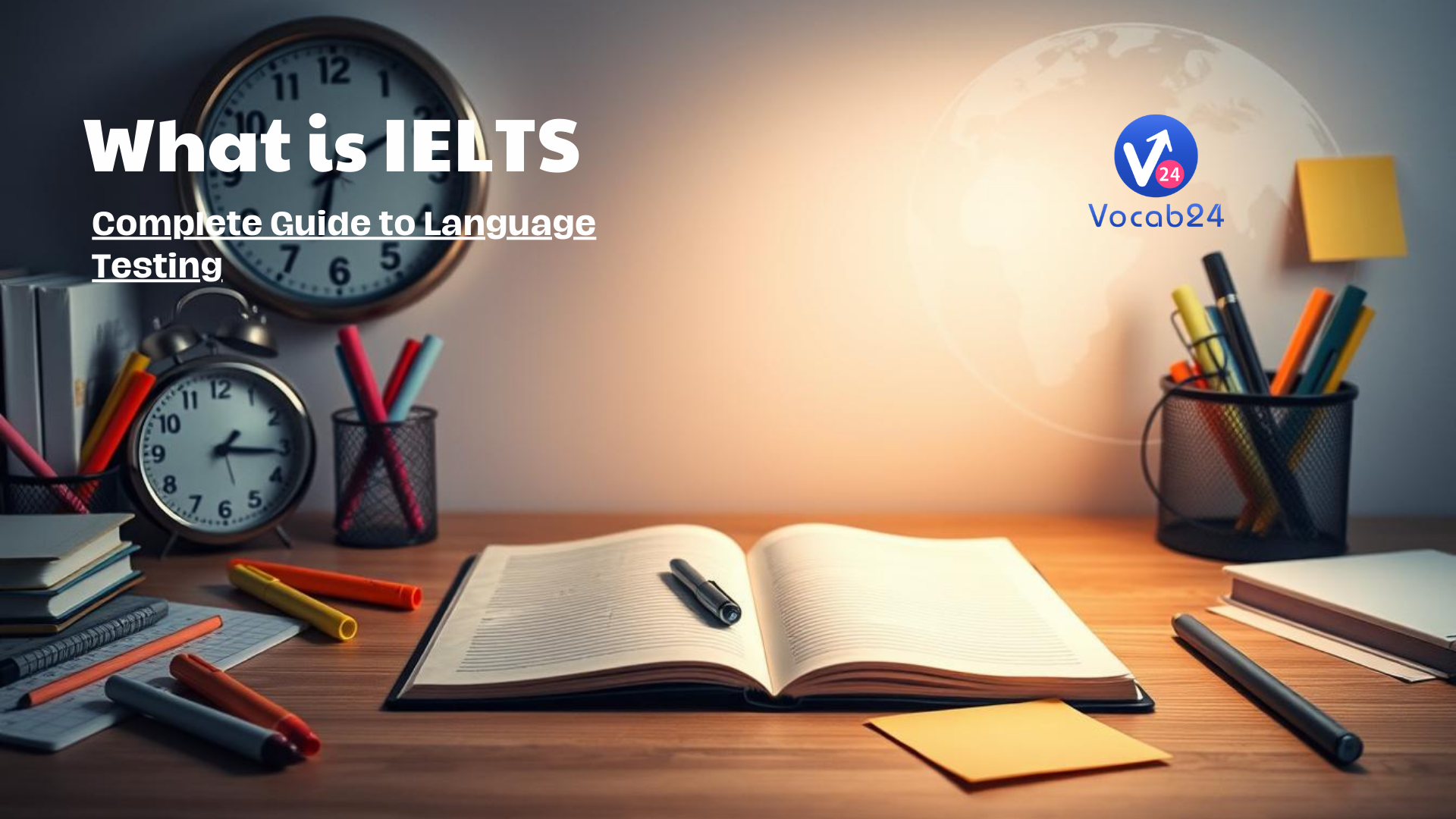What is IELTS? - Complete Guide to Language Testing
The IELTS (International English Language Testing System) is a top English language test.
It's recognized by over 11,000 organizations worldwide. It's used for study, work, and immigration. IELTS checks if non-native speakers can speak English well

If you want to study, work, or move to an English-speaking country, IELTS is key. It shows your English skills. This makes it a top choice for both individuals and schools.
The IELTS (International English Language Testing System) is a test that checks how well you speak English. It has two main parts: Academic and General Training. Each part tests your English skills but in different ways.
The Academic module is for those who want to study or work in English-speaking places. This includes university students and professionals in academia. It tests the English skills needed for higher education.
The General Training module is for people who need to show they can speak English for work, school, or moving to a new country. It checks your English for everyday and work situations.
The IELTS test has four main parts: Listening, Reading, Writing, and Speaking. Each part tests a different part of your English skills. This gives a full picture of your English ability.
The IELTS scores range from 1 to 9, with 1 being the lowest and 9 the highest. This detailed scoring helps show exactly how good your English is. It helps schools and employers know your level of English.
Knowing about the IELTS system helps you prepare better. It shows how to get the best English proficiency and band scores you can.
IELTS, or the International English Language Testing System, started in 1989. It was made by the British Council, IDP: IELTS Australia, and Cambridge English Language Assessment. They wanted to test English skills for education, work, or moving to English-speaking countries.
The idea of IELTS began in the late 1970s. At that time, there were many English tests, but they weren't the same everywhere. IELTS was created to fix this problem and set a global English language standard.
Since its start, IELTS has changed a lot. It has updated to meet the needs of the world. Some important changes include:
Now, IELTS is a top English test, with millions taking it every year. Its trust and global use make it key in English language testing history and growth.
| Year | Milestone |
|---|---|
| 1989 | IELTS was launched, with the first test administration in March 1989. |
| 1995 | The Academic and General Training modules were introduced, and the current 9-band scoring system was implemented. |
| Ongoing | Continuous updates and improvements to the test format, question types, and assessment criteria. |
"IELTS has become the gold standard for English language assessment, recognized by thousands of organizations worldwide."
IELTS stands for the International English Language Testing System. It's a test that checks how well you speak English. It covers four main areas: listening, reading, writing, and speaking.
Universities, employers, and immigration offices around the world accept IELTS scores. This makes it key for showing you can speak English well.
IELTS aims to accurately measure your English skills. It's valued by schools, work places, and government bodies. They see it as a fair way to check language skills.
Over 11,000 places globally accept IELTS scores. This includes top universities and immigration offices. It shows your English skills are recognized worldwide.
IELTS is run by the British Council, IDP: IELTS Australia, and Cambridge Assessment English. These groups work together to keep the test fair and consistent everywhere.
You can sign up for IELTS through any of these groups. It depends on where you are and which center you prefer.
IELTS is the most popular English test in the world. Every year, millions of people take it. Its global acceptance shows it's reliable and valid.
IELTS scores are accepted by over 10,000 places in more than 140 countries. This includes top universities and professional groups. It's a key step for studying, working, or moving to English-speaking countries.
| Test Administration Body | Key Facts |
|---|---|
| British Council | - Established in 1934 - Operates in over 100 countries - Provides English language assessment services worldwide |
| IDP: IELTS Australia | - Founded in 1969 - Major provider of international education services - Administers IELTS tests in over 50 countries |
| Cambridge Assessment English | - Part of the University of Cambridge - Over 100 years of experience in language assessment - Develops and delivers the IELTS test globally |
"IELTS is recognized by more than 11,000 organizations worldwide, making it the most widely accepted high-stakes English language test."
The IELTS listening test is a key part of the overall test. It checks how well you can understand and interpret spoken English. This section explains the types of audio recordings, question formats, and how to improve your listening skills.
In the IELTS listening test, you'll hear various audio recordings. These include conversations, discussions, lectures, and presentations. They mimic real-life situations, helping test administrators see how well you understand everyday English.
The IELTS listening test uses different question types to check your skills. These include:
Knowing these question types and practicing with IELTS listening test audio recordings can help. It lets you develop strategies to do well in the listening section and show off your listening skills assessment.
| Question Type | Description | Difficulty Level |
|---|---|---|
| Multiple-choice | Select the correct answer from a list of options | Moderate |
| Matching | Match items from two or more lists | Challenging |
| Sentence completion | Fill in the missing words or phrases in a sentence | Moderate |
| Note-taking and summary writing | Take notes and summarize the key information from the audio | Difficult |
Knowing the structure and format of the IELTS listening test helps. It lets you focus on improving your audio recordings understanding. This way, you can do well in this important part of the test.
https://www.youtube.com/watch?v=yTOqXLWpUmQ
The IELTS reading test is a key part of the IELTS exam. It checks how well you can understand and analyze written texts. This section will cover the different types of reading passages, question formats, and how to manage your time well.
The IELTS reading test has a wide range of reading passages. These cover topics from school subjects to general interest articles. The passages can be divided into several types:
The IELTS reading test uses many question formats to test your reading skills. These include:
Managing your time well is key in the IELTS reading test. You have just 60 minutes to finish it. Here are some tips to help you use your time wisely:
By knowing the different parts of the IELTS reading test and using good time management, you can do well in this important part of the IELTS exam.
The IELTS writing section is a key part of the exam. It tests your skill in writing in English. You'll face tasks like essay, report, and letter writing in both Academic and General Training modules.
In the Academic module, you have two tasks. The first is to describe or explain data from a graph or chart. The second is to write a clear essay on a given topic.
The General Training module also has two tasks. The first is to write a letter, like a complaint or application. The second is to write an essay on a specific topic.
Both modules are judged on how well you complete the tasks. This includes your ability to write clearly and accurately. By practicing different IELTS writing tasks, you can boost your score. This shows your skill in essay writing, report writing, and letter writing.
| IELTS Writing Task Types | Academic Module | General Training Module |
|---|---|---|
| Task 1 | Describe, summarize, or explain data presented in visual form | Write a letter responding to a given situation |
| Task 2 | Write a well-organized, coherent essay responding to a given prompt or argument | Write an essay on a given topic |
"The IELTS writing section is a true test of your ability to communicate effectively in written English, so it's important to practice a variety of writing tasks to prepare for the exam."
The IELTS speaking test is a key part of the IELTS exam. It checks how well you can speak and do interviews. This test lasts 11-14 minutes and has three parts. Each part tests different skills in speaking English.
The IELTS speaking test is judged on four main points:
The IELTS speaking test covers many topics, such as:
Knowing the format, what's being judged, and common topics helps you prepare. It's key to doing well in this important part of the IELTS exam.
The IELTS exam scores range from 0 to 9. These scores show how well someone can speak English. They are very important for getting into school, getting visas, and for work.
Each score has its own description. It talks about vocabulary, grammar, fluency, and comprehension. Knowing these descriptions helps a lot. It's key for getting into top schools, getting visas, or moving to new countries.
| IELTS Band Score | Band Descriptor | Typical Requirements |
|---|---|---|
| 9 | Expert User |
|
| 8 | Very Good User |
|
| 7 | Good User |
|
| 6 | Competent User |
|
| 5 | Modest User |
|
The IELTS score interpretation and band descriptors help a lot. They guide schools, immigration, and work places. They show if someone is ready for their requirements.
Getting ready for the IELTS test day is key to a smooth experience. You need to gather important documents and know the test center rules. Also, managing your time well is crucial. This section will help you with these important steps as you get ready for the IELTS test day.
On the day of your IELTS test, don't forget to bring these essential documents:
Each IELTS test center has its own rules to keep the exam fair and secure. Make sure you know these rules, which might include:
Managing your time well is vital during the IELTS test. Here are some tips to help you use your time wisely:
By following these guidelines and preparing well for the IELTS test day, you can boost your chances of getting the score you want. This will show your language skills effectively.
The IELTS test is key in checking English skills, a must for those looking to explore the world. It's for those wanting to study abroad, work internationally, or show off their language skills. IELTS is a standard way to prove your English ability.
Getting the IELTS score you want can lead to many chances. You might get into top schools or find great jobs. With good prep, you can make the most of the IELTS and succeed in your goals.
The IELTS journey is more than just a test. It shows your dedication to learning English. Take on the challenge, stay focused, and believe in your efforts. Your hard work will bring you new chances and help you grow.
IELTS stands for International English Language Testing System. It's a test for English language skills. It checks your ability in listening, reading, writing, and speaking.
IELTS has two main modules: Academic and General Training. The Academic module is for university study. The General Training module is for migration, work, or training.
The IELTS test has four sections: Listening, Reading, Writing, and Speaking. Listening and Speaking are the same for both modules. Reading and Writing differ.
IELTS scores range from 1 to 9. Your score is the average of your four section scores. Most places require a certain score for admission or immigration.
You can take the IELTS test with three partners: British Council, IDP: IELTS Australia, and Cambridge Assessment English. It's offered many times a month at test centers worldwide.
To prepare, practice all four skills and get familiar with the test. Use study guides and online courses to help. Focus on time management and task completion.
The Speaking test covers many topics like personal info, education, and work. Knowing these topics helps you speak more effectively.
Each band score shows your English level, from 1 to 9. The needed score depends on your purpose, like university or work. Knowing the band descriptors helps you understand your score.
Bring a valid passport or ID card to the test. Also, know the test center rules, like what items are not allowed and how to manage your time.





